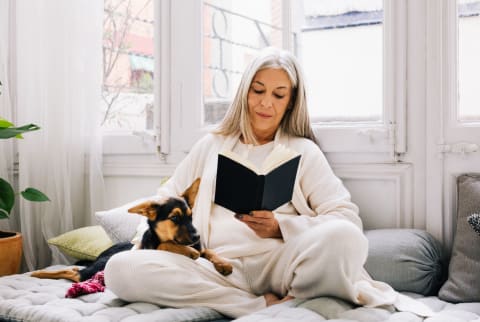Advertisement
Not Just Cute: Pets Are Very Good For Older People's Health


Humans have anecdotally sung the praises of owning pets, but a new poll shows that having a furry friend actually helps older adults cope with their own mental and physical health.
The National Poll on Healthy Aging surveyed 2,051 adults ages 50 to 80 and found 55 percent of adults have a pet. Of the pet owners, many of them pointed to the emotional benefits of the camaraderie their pets give them: 88 percent said that having pets helps them enjoy life, 86 percent said that pets make them feel loved, and 73 percent said pets provide them with a sense of purpose. (These effects shouldn't be understated: Research suggests loneliness can be detrimental to your physical health in old age, whereas having a sense of purpose is linked to more strength and walking speed later in life.)
But pet ownership itself had some even more direct benefits: 79 percent of older pet owners said their pets reduced their stress levels, 60 percent said pets help them cope with their physical and emotional health, and 34 percent said pets help take their mind off pain. Those numbers are even higher among the respondents who reported being in fair or poor physical health, with 72 percent reporting that pets help them cope with their health.
"Relationships with pets tend to be less complicated than those with humans, and pets are often a source of great enjoyment," one of the poll's authors said in a news release. "They also provide older adults with a sense of being needed and loved."
Additionally, 52 percent of pet owners said they got a pet specifically for companionship, and about half of all pet owners reported that their pet sleeps in the bed with them.
Despite the numerous ways that pets help older people's health, some pet owners reported drawbacks to having a pet, and those without pets mentioned the myriad reasons they didn't want a pet. Fifteen percent of pet owners said they put their pet's needs ahead of their own health needs, a figure that was even higher among respondents who reported being in poor health. For the respondents without pets, 42 percent said a pet would tie them down, 23 percent said they couldn't afford a pet, and 20 percent said they didn't have time to care for an animal.
"For people living on a fixed income, expenses related to health care for pets, and especially pets that have chronic health issues, can be a struggle. Older adults can also develop health problems or disabilities that make pet care difficult," the study's authors added.
Nonetheless, pet ownership has long been linked with better health. The American Heart Association has linked dog ownership in particular with greater longevity and reduced risk for heart disease, and veterinarian and pet parenting specialist Jeff Werber tells mbg that pets can reduce depression and encourage an active lifestyle. He adds that some therapy dogs are so smart they have been trained to alert diabetic owners of a drop in glucose, to bark and alert parents of children with seizures, and can even assist Parkinson's patients with household tasks like opening and closing doors.
The study drew the conclusion that the benefits of owning a pet far outweigh the negatives and suggested that older adults who enjoy the company of pets but cannot have one should look into volunteering at a local animal shelter, having visits with therapy pets, or do some light pet sitting for friends and family. Social services that assist older adults with the cost of pet care would also be helpful, and assisted living centers could also make pet care a more communal experience to alleviate the burden from individual pet owners.
There are also plenty of ways for the average person to help meet the need for some animal lovin': Individual pet owners can train their own pets to become therapy animals and take them to senior centers, hospitals, and retirement homes to provide comfort. Or if you know an older person with a pet, offering to pet sit or dog walk might be more helpful than you think.
Pets are good for everyone's health, so any way you can incorporate a fur baby into someone's life can be a meaningful and impactful act.
Watch Next
Enjoy some of our favorite clips from classes
Enjoy some of our favorite clips from classes
What Is Meditation?
Mindfulness/Spirituality | Light Watkins
Box Breathing
Mindfulness/Spirituality | Gwen Dittmar
What Breathwork Can Address
Mindfulness/Spirituality | Gwen Dittmar
The 8 Limbs of Yoga - What is Asana?
Yoga | Caley Alyssa
Two Standing Postures to Open Up Tight Hips
Yoga | Caley Alyssa
How Plants Can Optimize Athletic Performance
Nutrition | Rich Roll
What to Eat Before a Workout
Nutrition | Rich Roll
How Ayurveda Helps Us Navigate Modern Life
Nutrition | Sahara Rose
Messages About Love & Relationships
Love & Relationships | Esther Perel
Love Languages
Love & Relationships | Esther Perel











